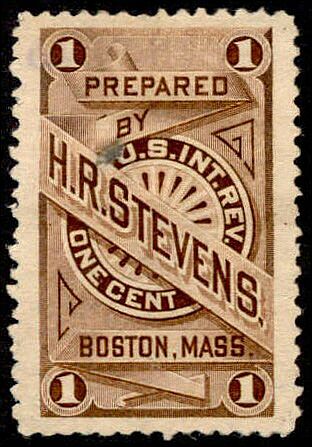
H.R. Stevens & Company

Vegetine, "an Indian Remedy," was developed in 1851 by a Dr. Cummings who lived in the Boston area. At that time Henry R. Stevens was in the shipping business in Boston. By 1871 Stevens was the sole proprietor of Vegetine.
General issue proprietary stamps were used for the product until January of 1878. The six-cent black stamp was first issued then, and last delivered on November 24, 1880. 521,572 were printed on pink and watermarked papers. This one is on watermarked paper.


In 1878, Stevens took control of Dr. Soule's Oriental or Soverign Balm Pills, and shortly after he became proprietor of Week's Magic Compound which, amazingly enough, said that it "is not a SPECIFIC FOR CONSUMPTION, but it will arrest and cure those maladies which lead to it."
The acquisitions required one- and two-cent stamps, so new designs were issued in 1879. The one-cent brown was issued from then until October 1, 1880. 25,000 were printed, all on watermarked paper.
The two-cent chocolate stamps were issued until April 4, 1883. 539,773 were printed, on watermarked paper.

It is possible that Vegetine was sold in seventy-five-cent bottles until sometime in 1877. General issue three-cent stamps are known with Stevens cancels, as well as some two-cent stamps.

"Major is the name of this pure blood Newfoundland dog, owned by the proprietor of Vegetine. Major is six years old, weighs 125 pounds; is very intelligent, sagacious and faithful; a good watch-dog, and a great pet among children. This picture was lithographed from an oil painting taken from life. Major is called the handsomest dog in New England."

Familine was another Stevens product.

A listing of the cures claimed for Familine, which could be used either externally or internally!